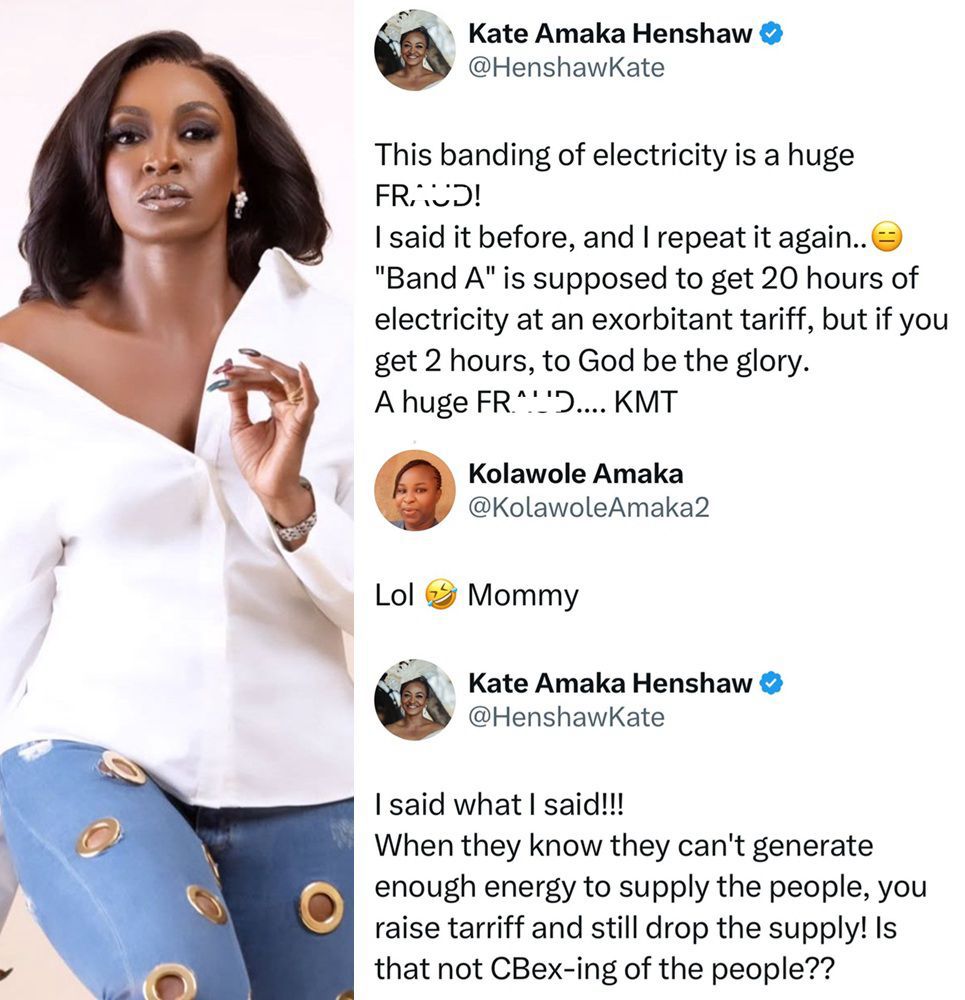
"Electricity Banding Is a Huge Scam!" – Kate Henshaw Blasts Power Tariff Hike Amid Poor Supply

Nigerian actress and vocal social critic, Kate Henshaw, has once again taken to social media to express her frustration with the state of electricity in the country, calling the current banding system a “huge fraud.” The veteran actress, known for not mincing words when it comes to issues affecting the masses, did not hold back in her latest outburst as she decried the worsening power supply despite skyrocketing electricity tariffs under the new band classification system.
The recent changes in Nigeria’s electricity distribution model have introduced what is called the “Band A” category—areas that are promised up to 20 hours of electricity daily at a significantly higher cost. But according to Henshaw, this supposed premium service is anything but consistent. In a blunt post on X (formerly Twitter), she wrote, “This banding of electricity is a huge FR..SD! I said it before, and I repeat it again… ‘Band A’ is supposed to get 20 hours of electricity at an exorbitant tariff, but if you get 2 hours, to God be the glory. A huge FR^D… KMT.”
Her comments immediately resonated with many Nigerians who are also feeling the heat from the recent hike in electricity tariffs, which some have described as a tone-deaf move in a country already grappling with economic hardship, inflation, and poor infrastructure. The promise of 20-hour uninterrupted power supply has proven to be a fantasy for many consumers, who have instead experienced erratic electricity, blackouts, and growing electricity bills that don’t reflect the service received.
Henshaw, never one to stay quiet in the face of injustice, doubled down on her criticism in a follow-up tweet: “I said what I said!! When they know they can't generate enough energy to supply the people, you raise tariff and still drop the supply! Is that not CBex-ing of the people??” Her use of the phrase “CBex-ing” appears to be a clever play on the word "cheating" and possibly a dig at the regulatory or distribution bodies responsible for the electricity reforms.
While some social media users attempted to downplay her comments with casual jokes—one user, @KolawoleAmaka2, replied “Lol Mommy”—Henshaw remained unmoved and unapologetic in her stance. She represents a growing voice among Nigerian celebrities and citizens alike who are becoming increasingly vocal about the daily challenges of life in the country, particularly those worsened by government policies that appear disconnected from the realities on ground.
The electricity banding system was introduced as part of a reform effort to help improve service delivery by allowing DisCos (Distribution Companies) to focus on areas with stronger infrastructure and higher revenue potential. Customers are divided into five bands—A to E—based on the number of hours of power supply they receive, with Band A receiving the most. However, what was meant to be a tiered solution has been heavily criticized for being inequitable and exploitative, especially as those in Band A are being charged more without a corresponding improvement in service.
Many have raised concerns about the lack of transparency in the criteria used for the band allocations, the inability of consumers to contest their categorization, and the complete lack of accountability when promised supply levels are not met. For instance, households and small businesses under Band A have reported being billed astronomically despite suffering from constant blackouts and load shedding.
In this climate, Henshaw’s voice is not just the rant of a frustrated celebrity; it reflects a national sentiment. The power sector, despite being privatized, has continued to struggle with systemic failures—aging infrastructure, inconsistent generation, poor transmission networks, and chronic underinvestment. The impact on citizens is not just economic but psychological. People are paying more for less, and they are exhausted.
Nigerians who responded to Henshaw’s post have shared similar stories—some say they haven’t had power for more than four hours a day since the new banding was introduced, while others lament being billed according to Band A prices without receiving anything close to the promised 20 hours of electricity. It’s a shared pain that cuts across class and region, affecting everyone from market traders to remote workers to students trying to study at night.
Henshaw’s tweets have sparked a new wave of conversation, with many urging the government to not only revise the banding system but also to focus on actual improvements in power generation and distribution. There have also been renewed calls for consumer protection mechanisms that will allow citizens to report and challenge unfair billing and false supply claims by distribution companies.
As of now, neither the Nigerian Electricity Regulatory Commission (NERC) nor any of the major DisCos have responded publicly to the actress's viral tweets. However, this is not the first time the public has called out these bodies. Time and again, Nigerians have demanded more accountability and transparency in the power sector, only to be met with silence or vague promises of improvement.
With Kate Henshaw’s influence and the widespread public attention her statement has garnered, it’s possible that this issue will gain enough traction to force a review of the banding system or at the very least prompt the authorities to provide more honest answers. But for now, millions of Nigerians are left with the reality of dark nights, noisy generators, and the bitter taste of a system that seems to be rigged against them.
In a country where reliable electricity is still a luxury despite decades of promises and billions of dollars invested, Henshaw’s voice is not just speaking truth to power—it’s speaking on behalf of a nation tired of being shortchanged in the dark.


